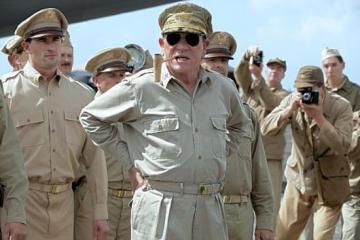Tommy Lee Jones re-interprets MacArthur in 'Emperor'
Omitting "the" before "Emperor" is a clever ambiguity on director Peter Webber's part. Military historical films from "Lincoln" and "Argo" to "Zero Dark Thirty" are the rage these days, and Mr. Webber's movie -- on the first days after Japan's surrender in World War II -- is no slouch. The title seems an obvious reference to Hirohito.
But it could equally describe Gen. Douglas MacArthur -- the supreme commander of occupying forces and de facto ruler -- whose powers were every bit as imperial as the defeated Japanese monarch's.
First order of business for MacArthur (Tommy Lee Jones, below) is rounding up the major war criminals and deciding whether Japan's emperor is one of them: Did Hirohito himself order, or at least approve, the attack on Pearl Harbor? What to do now with this weird dude dubbed a "deity" by his devastated people -- depose, pardon or hang him? Momentous long- and short-range implications included possibly igniting a revolt.
With everyone back home clamoring for the noose, MacArthur puts Brig. Gen. Bonner Fellers (Matthew Fox), his protege and close adviser, in charge of the Hirohito investigation. But Fellers -- an expert on All Things Japanese, including the imperial household and the Japanese military mind -- will also be conducting a surreptitious personal investigation to find Aya (Eriko Hatsune), the beautiful Japanese exchange student he fell in love with back during his college days in Indiana.
Written by Vera Blasi and David Klass based on "His Majesty's Salvation" by Shiro Okamoto, "Emperor" and director Webber ("Girl With a Pearl Earring," 2003) do a good job of depicting the esoteric rituals and intricate power web surrounding the Chrysanthemum Throne -- "a mystery even unto itself." Could Hirohito have stopped Pearl Harbor or the war, even if he'd wanted to? There's no black or white answer, just infinite shades of gray.
MacArthur is also enigmatic, in his way, and it's too bad the film's central figure and focus are on Fellers instead of him. But even in the supporting rather than leading role, Mr. Jones is marvelous, perfectly capturing the American Caesar's supreme self-confidence and self-promotional swagger with the uniquely entertaining mannerisms and low-key bombast he brought to "No Country for Old Men" and "Lincoln."
Mr. Fox's performance, on the other hand, is burdened by a kind of dullness that's more the screenplay's fault than his own. His highly fictionalized melodrama with the girl seriously distracts us from the main fact-based drama, and bogs down the film, though those plot deficiencies are partly offset by authentic production values and the fine cinematography of Stuart Dryburgh, contrasting Japan's peacetime beauty with its wartime devastation.
Eriko Hatsune does the best she can with her standard love-interest role. Other Japanese actors do better with better roles -- notably Masato Ibu as Lord Keeper of the Privy Seal, trying to preserve the Emperor's honor (and privacy), and wonderful Takataro Kataoka as Emperor Hirohito himself.
A few fascinating factoids on the real Fellers (1896-1973): As the Army's psychological warfare director, he was assigned to the U.S. Embassy in Egypt to report on British military operations in the Mediterranean in 1941. Given full access to their activities, he sent back reports by radiogram encrypted in the "Black Code" that was broken by German cryptanalysts. The resulting treasure trove of information alerted the Axis, cost many lives of British and Free French fighters, and caused him to run afoul of Gen. Dwight Eisenhower, who later returned him to the rank of colonel. He left the Army to work for the Republican National Committee and Robert Taft's campaign for president in 1952. After Taft's defeat by Eisenhower for the GOP nomination, Fellers joined the John Birch Society and actively promoted Barry Goldwater for president.
As for MacArthur, his enlightened dictatorship -- and decision to respect rather than override cultural differences -- led Japan to its spectacular postwar recovery, from feudal autocracy to modern democracy and harmony with the West. Whatever else Big Mac did wrong (which was plenty, in Korea), he did this crucial thing right.
Turns out -- for both emperors -- that ending the war was more important than the starting of it in a conquered country with 2 million soldiers and 800,000 civilians dead. This is a flawed but compelling movie about justice vs. revenge.






